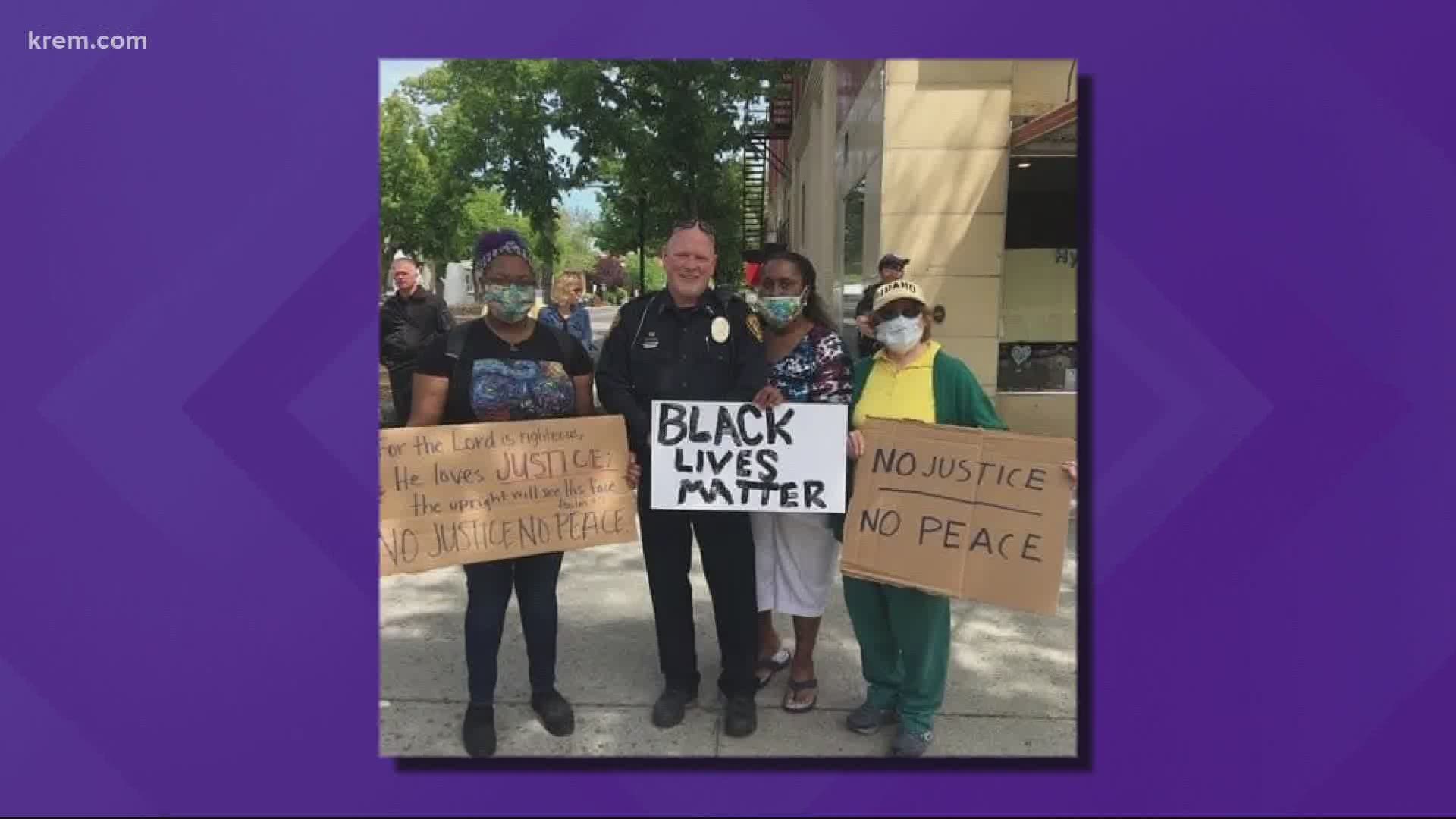MOSCOW, Idaho — The population of Moscow, Idaho, is 90% white, according to July 2019 estimates from the United States Census Bureau. Only 1.2% of the city’s population is Black, based on the same estimates.
KT Turner is attending the University of Idaho in Moscow to earn her Master of Fine Arts degree in theater arts, with a concentration in directing.
A recent post from Turner in Pantsuit Nation, an activist group on Facebook with more than 3 million members, details her experience living as a Black woman in Moscow. Since her story was posted in the group on Aug. 20, it has received more than 11,000 interactions and 1,500 comments.
In the post, Turner said her closest friends in Moscow are white or “exceptionally white passing.” The only other Black person she knows lives 45 minutes south of the city, she added.
“I live in a constant state of terror. I exist in this town my guard constantly raised. I do not do anything alone without 5 people knowing it,” Turner wrote in the post.


Turner discussed the lack of diversity in Moscow during a conversation with KREM. She said the situation isn't new for her, as she was used to being the only Black student in her classroom while growing up in southeastern Louisiana.
“When I got here [Moscow], it was immediately apparent. Usually you can walk down a street and see multiple people of color, but there was one time I was walking down the street with my friends and I was the only one, and that was different than I’d ever experienced,” Turner said.
In her conversation with KREM, Turner said she hasn’t experienced any “overt prejudice” in Moscow, but that doesn’t lessen the discomfort that she often feels.
“Nothing has overtly happened, but…in the past few months, I’ve felt the eyes. I’ve felt, like, more people looking at me. I’ve felt the tension,” she said.
Turner said she participated in many Black Lives Matter protests at the beginning of the summer, but she reached a point where she felt like she needed to stop and make herself “invisible.”
“I had, at the time, bright purple hair and I’d given so many interviews. I was in different papers, I was on the news. I was like, ‘Someone’s going to come after me if I keep talking like this.’ It was worrisome,” she said.
PHOTOS: KT Turner
At one protest where Turner was a speaker, someone confronted her and other activists with opposition to the Black Lives Matter movement.
“It upset me to my core some of the things that he was saying. But it turns out that he didn’t really understand what he was against, so it just took a conversation,” Turner said while describing the experience.
Though Turner and other activists faced both opposition and indifference to protests in Moscow, she said other residents were supportive of their message.
Turner’s experience of living in Moscow has been isolating at times, as she doesn’t feel there are many people who can relate to her lived experience as a Black woman. But she has found support in the community, in part through her studies and work at the University of Idaho.
“I work for the Office of Multicultural Affairs on campus now, so part of my job is to really work with other multicultural students, and make them feel seen and visible on campus,” Turner said. “So being able to use how I felt when I moved here, and how I felt over the summer, to really help these students and let them know, ‘Hey, you’re not alone. You do have a community here.’”
Regardless, Turner said she has a “list of fears” that follow her everywhere that she goes. Those anxieties were only amplified when she moved to Idaho, a place that has a “dark reputation” for people of color, she said.
In her now-viral post and during her conversation with KREM, Turner said she does not feel safe walking alone, especially at night.
“I don’t feel safe dealing with the police force – not because I think they’re bad but because I think they’re not fully equipped to handle race issues because they don’t have to worry about if often,” she added.
Turner also avoids going for solo hikes, writing in her post, “Adventures in the wilderness to clear my head? No thanks.”
“My body could be in the forest for a very long time, and no one would know who did it, why it happened,” she said during her conversation with KREM.
Turner said she originally wrote her post in early June before it was shared to Pantsuit Nation in August.
“When I originally wrote it, it was like a cry from within me, and from where I know a lot of Black females come, and a lot of Black females who are super accepted by the white community,” she said.
After her message was posted to the Facebook group, Turner said she experienced an outpouring of love, compassion and concern from its members. She described the experience as both overwhelming and touching.
Now, Turner hopes that those who have shared her story will take what they have learned and use it to make action items.
“I don’t want to just be a girl with a story. I want to be the girl who had a story that inspired action,” she said.
In Moscow, Turner said she hopes people will call attention to issues that they see.
“There is a racism here. It’s not as bad as it is in Coeur d’Alene, it’s not as overt as it is in Northern Idaho, but there is still racism here and people are comfortable,” Turner said.
“There are still things that can be done. I really think people are complacent and comfortable, and they think that these things don’t pertain to them. But I need them to understand that our little bubble still fits in this nation,” she added.









